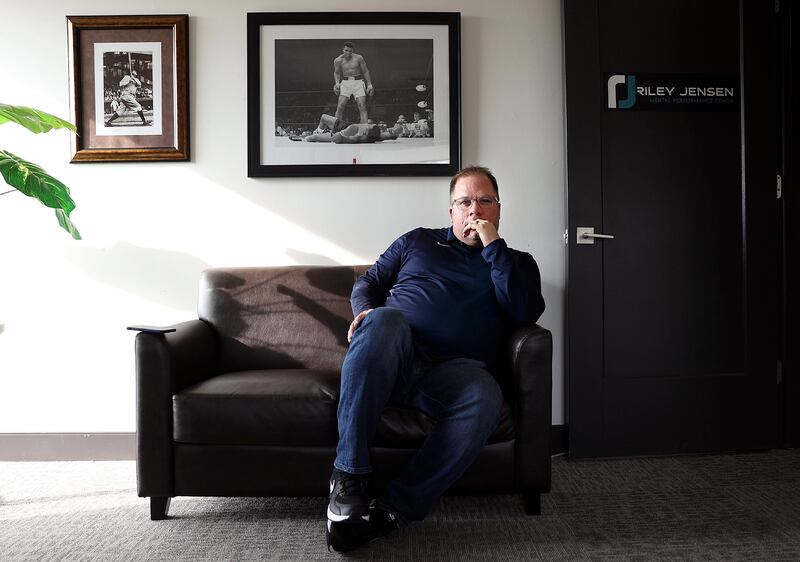Riley Jensen is telling a story about rats.
It’s just before noon on a Wednesday morning at RJ Performance Group, the sports psychology firm Riley started four and a half years ago. It’s a three-person operation. His mental performance coaching colleagues, Justine Jones and Jon Osborn, are in their offices, talking with clients. And Riley, he’s explaining what he does and why it’s important. With rats.
There was a study conducted at Harvard, he says, that involved putting rats in a tank of water and seeing how long they could swim. After 15 minutes the rats were exhausted and started to sink, at which point the scientists in their white coats came to the rescue and pulled them to safety.
They took the rats to a warm, dry spot, dried them off, “gave them whatever you would think would be a hug for a rat,” and allowed them time to recover.
Then they put them back in the tank.
“Guess how long they swam this time, after they felt a little bit of reassurance that there was somebody there who cared about them and would help them out?” asks Riley.
“Uh, a lot more,” I guess.
“How much more is a lot more?”
“Two hours?”

“Nope. Sixty hours,” Riley beams. “That’s right, they went from 15 minutes to 60 hours of swimming. Once the rats believed they would eventually be rescued, they could push their bodies way past what they previously thought impossible. If that’s not an explanation of what hope can offer, I don’t know what is.”
Hope is what Riley Jensen, once a quarterback of the body, now a quarterback of the mind, is selling these days. Not to rats, to athletes.
“I’ve gotta admit, I have the best job in the world,” he says. “I get paid to help people go after their dreams. Whether it’s in the business world or the athletic world, what could possibly be better than trying to help people live their dreams?”
If this sounds like the fervor of a recent convert, that’s because it is.
Six and a half years ago, when Riley was 41 years old, he called an audible and went back to school to get his master’s degree in sports and exercise psychology.
Wait, check that. It was Riley’s wife who called the audible.
After his college and playing days were over — Riley played quarterback at Snow College (he was first team All-American when he led the country in passing yards and touchdowns in 1996) and a D1 starter at Utah State in 1998 — Georgeann Jensen watched as her husband bounced from job to job that weren’t the right fit. He first coached football at the high school and college levels, then tried his hand at sales.
All the while he talked about his fascination with sports psychology.
Seeing this, Georgeann said, in effect, “Go back to school and get your degree. I can keep working.”
“That was surprising, because she is not a big risk-taker,” says Riley. “So when she said it, it was like E.F. Hutton back in the day. You listen.”
“Go chase your dreams,” said Georgeann.
Ever since he’s been helping others chase theirs.
* * *
In 2017, after the University of Utah awarded him his master’s degree, Riley started RJ Performance Group. It wasn’t so much that he wanted his name on the door as the lack of other options. His is what they call an emerging profession.
“There aren’t that many sports psychology jobs, period. Here or around the country,” he says. “But I like our timing. I feel like we’re the strength and conditioning coaches of 20 years ago. Then, people were like, ‘Oh, you don’t want to lift weights if you’re a basketball player, that’s the dumbest thing you can do, it’s going to ruin your shot.’ Now, every basketball team not only has a strength and conditioning coach but a lot of players have an individual strength and conditioning coach.”
Since he entered the profession, he’s watched as the stigma that tends to surround all aspects of mental health, in sports especially — “Why would I need that? There’s nothing wrong with my head” “You want me to talk about my feelings!” — keeps dissipating.
In what he terms “The anxiety generation,” he’s finding more and more athletes willing to accept a mental performance coach like any other coach on the staff. (The most recent season of the hit Apple TV series “Ted Lasso” features a sports psychologist in the soccer club’s locker room. “We (sports psychologists) were nervous about how we would be represented,” says Riley. “But we thought they did a good job, showing she was human, showing she was vulnerable, showing that she cared.”)
Less than five years into his new career, Riley already has contracts to work with the athletes at Utah State University and Weber State University, and in a case of life imitating art, he is the Lead Mental Performance Coach for the Real Salt Lake soccer club.
In his sessions, he gets to dispense all the science of sports psychology he learned through his academic studies; showing athletes the tools that can enable them to better handle pressure and anxiety and perform at their highest level.
But first, he gets to win them over.
“I love the science of sports psychology more than anybody,” he says. “But the longer I do this the more I’m realizing how important it is to first know there’s someone who is on your side. Sometimes my best sessions have nothing to do with science and tools and everything to do with leaving them with a feeling that they’re cared about, that there’s hope.”
Like the Harvard rats.
“Yeah, like the rats,” says the CEO of RJ Performance Group. “If hope can cause exhausted rats to swim for 60 hours, what could a belief in yourself and your abilities do for you? Remember what you’re capable of. Remember why you’re here. Keep swimming.”

